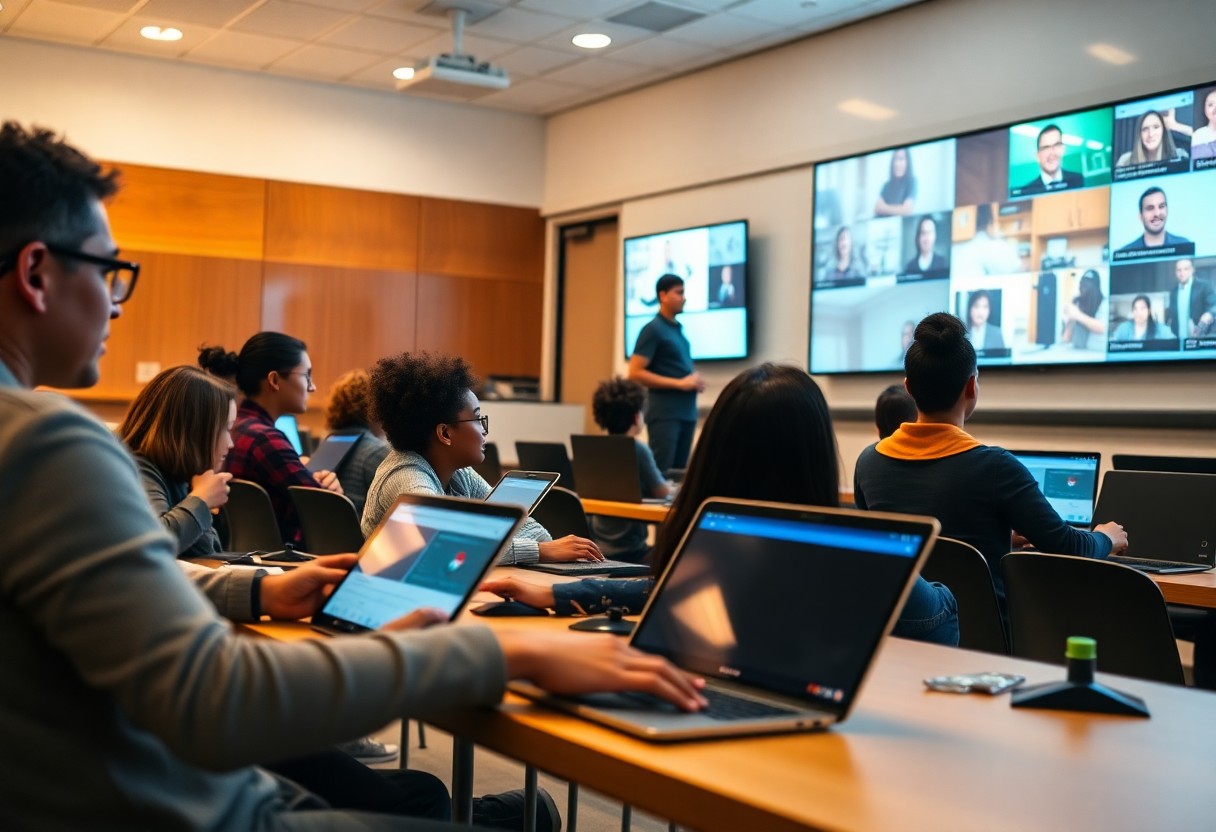Over the past decade, the integration of artificial intelligence in education has begun to reshape traditional learning methods, presenting unique opportunities for you and your students. By harnessing the power of AI, you can create personalized learning experiences, adapt curricula to meet diverse needs, and facilitate more engaging teaching practices. This blog post explores how these innovations in artificial intelligence can transform educational paradigms, ultimately enhancing the effectiveness and accessibility of learning for all. Get ready to discover how AI can empower you to revolutionize the educational landscape in profound ways.
Key Takeaways:
- Personalized Learning: Artifice in intelligence can create individualized educational experiences, adapting materials and resources to meet the unique needs of each student.
- Enhanced Engagement: Innovative AI-driven tools can increase student motivation and interest by providing interactive and immersive learning environments that align with modern technology trends.
- Data-Driven Insights: Utilizing AI allows educators to analyze student performance data effectively, enabling the identification of learning gaps and targeted interventions to improve outcomes.
Understanding Artifice in Intelligence
Your comprehension of artifice in intelligence can significantly enhance your learning experiences and educational methods. This concept encapsulates the simulation of intelligent behavior through artificial systems, which can mimic human thought processes, decision-making, and problem-solving capabilities. As you probe deeper into this field, you’ll discover its potential implications for revolutionizing traditional educational paradigms.
Definition and Scope
On a foundational level, artifice in intelligence refers to the development of systems that emulate cognitive functions traditionally associated with human intelligence. This includes reasoning, learning, and adapting to new information. The scope of this concept extends not only to technology but also to the methodologies employed in educational strategies, impacting how you approach learning and knowledge acquisition.
Historical Context
An exploration of the historical context of artifice in intelligence reveals its evolution from early computational theories to advanced machine learning algorithms. As the field emerged in the 20th century, you can trace its roots back to pioneering figures like Alan Turing and John McCarthy, who laid the groundwork for modern artificial intelligence. Over decades, innovations have transformed educational tools, shifting paradigms from rote memorization to interactive learning environments.
Scope also matters in understanding the significance of the historical context. You can see how societal needs and technological advancements have shaped the development of intelligent systems. From the early days of simple rule-based systems to today’s complex neural networks, each milestone reflects changing educational demands. As you consider these advancements, take note of how historical milestones continue to influence modern teaching, enhancing learning experiences and shaping the future in the classroom.
The Role of Artifice in Educational Technology
Any discussion about the transformation of educational paradigms must acknowledge the critical role of artifice in educational technology. As you navigate through modern learning environments, it’s evident that advanced artificial intelligence applications reshape how learners engage with content. This shift fosters individualized learning experiences and enhances interaction between students and educational resources, ultimately promoting deeper understanding and retention of knowledge.
Adaptive Learning Systems
An adaptive learning system personalizes your educational experience by responding to your unique learning pace and style. With the help of artificial intelligence, these systems analyze your interactions and performance data, allowing them to adjust content in real time. This dynamic approach not only keeps you motivated but also helps identify areas needing reinforcement, ensuring a more effective learning journey.
Intelligent Tutoring Systems
Technology has propelled the development of intelligent tutoring systems that mimic one-on-one tutoring experiences. These systems provide customized feedback and guidance, addressing your specific learning needs. By analyzing your performance, they adapt the instructional pace and content complexity, creating a learning environment tailored just for you.
Artifice lies at the heart of intelligent tutoring systems, revolutionizing how you approach learning. These systems utilize sophisticated algorithms to assess your strengths and weaknesses continually. They adjust their teaching methods accordingly, ensuring that the material is neither too easy nor too challenging. By engaging with this technology, you benefit from a nurturing educational framework that empowers you to grasp concepts more deeply and effectively, offering a personalized pathway to academic success.
Transformative Potential of Artifice in Learning
Now, the integration of artificial intelligence in education offers transformative potential that can reshape how you learn. By leveraging intelligent algorithms, educational platforms can evolve to meet diverse learning needs, enabling tailored experiences that can significantly enhance knowledge retention and skill acquisition. The adaptive nature of artifice in learning promotes an individualized approach, encouraging deeper engagement with educational content and fostering critical thinking.
Personalized Education
For you as a learner, personalized education means that your unique strengths, weaknesses, and preferences are taken into account. With AI algorithms analyzing your performance, resources can be dynamically adjusted to provide tailored instruction, ensuring that you receive the right support exactly when you need it. This personalized approach can help you achieve your educational goals more effectively and efficiently.
Engagement and Motivation
To maximize your learning experience, engagement and motivation play crucial roles in your educational journey. By integrating interactive elements and adaptive learning strategies, artificial intelligence can create an immersive environment that captivates your interest and keeps you motivated to explore various subjects.
Learning environments enhanced by AI can cater to your preferences in real time, presenting challenges and rewards that resonate with you personally. Gamification elements, such as badges and leaderboards, can foster friendly competition, while personalized feedback can help track your progress, keeping you on a path of continuous improvement. As you remain engaged and motivated, you’ll be more inclined to explore new concepts, solidifying your understanding and preparing you for future challenges.
Challenges and Ethical Considerations
Once again, as we explore the intersection of artificial intelligence and education, we must confront significant challenges and ethical considerations. These complexities arise not only from the integration of technology into learning environments but also from the responsibilities you bear in ensuring that such advancements are used ethically and equitably. Addressing these issues is paramount to fostering a healthy educational ecosystem that prioritizes inclusivity and respect for all learners.
Data Privacy and Security
The implementation of AI in education raises critical questions about data privacy and security. Your educational data, as a student or educator, often contains sensitive information. It is necessary to ensure that robust measures are in place to protect this data from breaches and misuse, as well as to balance the benefits of personalized learning with the need to safeguard your privacy.
Bias and Fairness in AI
The influence of bias and fairness in AI systems cannot be overlooked. If the algorithms driving educational tools are based on biased data, they may perpetuate existing inequities, which can affect your learning experience. As a user, you must remain vigilant and advocate for transparency in these systems’ design and deployment to ensure that all learners are treated fairly and equitably.
Privacy concerns extend beyond mere data protection; they encompass the potential biases embedded within AI algorithms that could influence your educational outcomes. AI systems can inadvertently learn from skewed datasets, leading to discriminatory practices in grading, accessibility, and resource allocation. You have the responsibility to question and demand fairness in these technologies, advocating for inclusive designs that prioritize diversity and equitable representation in educational settings.

Teacher’s Role in an AI-Enhanced Classroom
Despite concerns about the automation of education, your role as a teacher remains crucial in an AI-enhanced classroom. Rather than replacing your expertise and guidance, artificial intelligence serves as a tool that can enrich your educational practices. You are empowered to leverage this technology to personalize learning paths, facilitate innovative methodologies, and foster a deeper connection between students and their educational journeys.
Evolving Responsibilities
With the integration of AI in education, you will find your responsibilities evolving to meet new challenges and opportunities. This includes becoming proficient in AI tools yourself, using data analytics to tailor curriculum, and fostering critical thinking skills among your students. Your role will now encompass acting as a facilitator, guiding students in their use of artificial intelligence as an educational resource.
Professional Development and Training
With technology advancing rapidly, ongoing professional development and training become vital for you to remain effective in your teaching practice. Understanding and integrating AI tools requires a commitment to continual learning, participation in workshops, and collaborative experiences with fellow educators. By investing in your professional growth, you equip yourself to maximize the benefits of AI in your classroom.
A comprehensive approach to professional development is vital for your success in leveraging AI in teaching. You should seek out training programs that focus not only on technical skills related to AI platforms but also on pedagogical strategies that incorporate these tools effectively. Collaborating with your peers, attending conferences, and enrolling in specialized courses will enhance your ability to innovate and inspire your students, ensuring that you remain at the forefront of educational excellence.
Future Directions in Educational Paradigms
Many educators and institutions are beginning to embrace innovative approaches that integrate artifice in intelligence into their curricula. This shift aims to align educational practices with the evolving demands of the digital age, fostering an environment where students can thrive. You can expect to see a blend of personalized learning experiences, adaptive assessments, and collaborative problem-solving methods that leverage technology to enhance the educational journey.
Emerging Technologies
On the horizon, you will encounter a wave of emerging technologies that promise to reshape educational landscapes. Tools such as augmented reality, virtual reality, and intelligent tutoring systems will offer personalized learning experiences tailored to your unique needs, thereby enhancing engagement and retention. By incorporating these technologies, educators can help you visualize complex concepts and practices in innovative ways.
Long-term Impacts on Education
Future educational paradigms driven by artifice in intelligence will create profound long-term impacts that you can benefit from. These changes will facilitate an ongoing evolution in teaching methods, ensuring that education becomes more accessible, equitable, and relevant to your life and career aspirations.
Impacts on education could lead to a more inclusive environment where learning is personalized to meet your unique requirements. Expect to see increased collaboration between learners and educators, fostering a community that values shared knowledge and experiences. In addition, the continuous integration of advanced technologies in your learning journey will equip you with vital skills imperative for navigating an increasingly complex workforce, ultimately enhancing your adaptability and critical thinking abilities.
To wrap up
Presently, the artifice in intelligence is poised to revolutionize educational paradigms by personalizing learning experiences, enhancing accessibility, and fostering creativity. As you embrace these advancements, you will witness an education system that caters to your individual needs and empowers you to acquire knowledge at your own pace. This transformation paves the way for innovative teaching methodologies that engage you in meaningful ways, encouraging critical thinking and lifelong learning. Therefore, embracing this evolution not only enriches your educational journey but also prepares you for a dynamic future.
FAQ
Q: How can artificial intelligence enhance personalized learning experiences in educational settings?
A: Artificial intelligence can analyze individual students’ learning patterns, strengths, and weaknesses. By leveraging this data, AI systems can tailor educational content to meet the unique needs of each learner. This personalization can include adapting the difficulty level of assignments, suggesting additional resources, and providing customized feedback. As a result, students can engage with material that is more relevant to their interests and learning pace, ultimately improving their academic outcomes.
Q: What role do AI-driven tools play in assessing student performance and progress?
A: AI-driven tools can provide real-time analytics and insights into student performance, allowing educators to track progress with remarkable accuracy. These tools can evaluate test scores, participation, and engagement levels, offering detailed reports that highlight areas where students excel or struggle. Educators can use this data to make informed decisions about curriculum adjustments, identify students in need of additional support, and enhance overall teaching methodologies, fostering a more effective learning environment.
Q: In what ways can AI facilitate collaboration and communication among students and teachers?
A: AI can streamline collaboration by providing platforms that enhance communication among students and teachers. Tools such as chatbots can assist in answering common questions, while collaborative software can enable real-time project sharing and brainstorming sessions. Furthermore, AI can help in pairing students for group work based on complementary skills or interests, promoting teamwork and peer learning. By fostering a more connected educational community, AI can enhance interaction, build relationships, and support collaborative learning opportunities across diverse student populations.




